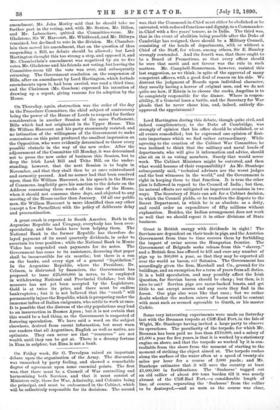On Friday week, Sir G. Trevelyan raised an important debate
upon the organisation of the Army. The discussion was unmarked by party feeling, and showed a remarkable degree of agreement upon some essential points. The first was, that there must be a Council of War controlling and harmonising both Services, and that it must consist of Ministers only, those for War, Admiralty, and Colonies being the principal, and must be embosomed in the Cabinet, which will be collectively responsible for its decisions. The second was, that the Command-in-Chief must either be abolished or be entrusted, with reduced functions and dignity, to a Commander- in-Chief with a five years' tenure, as in India. The third was, that in the event of abolition being possible after the Duke of Cambridge has resigned, there should be a Military Council, consisting of the heads of departments, with or without a. Chief of the Staff, for whom, among others, Sir E. Hamley strongly contended. And the fourth was, that there ought to be a Board of Promotions, so that every officer should be sure that merit and not favour was the rule in such matters. Mr. Campbell-Bannerman, however, resisted this last suggestion, as we think, in spite of the approval of many competent officers, with a good deal of reason on his side. We distrust the judgment of Boards upon individual character, they usually having a horror of original men, and we do not quite see how, if Edwin is to choose the cooks, Angelina is to be completely responsible for the dinner. Where is respon- sibility, if a General loses a battle, and the Secretary for War pleads that he never chose him, and, indeed, entirely dis- approved the appointment?


































 Previous page
Previous page